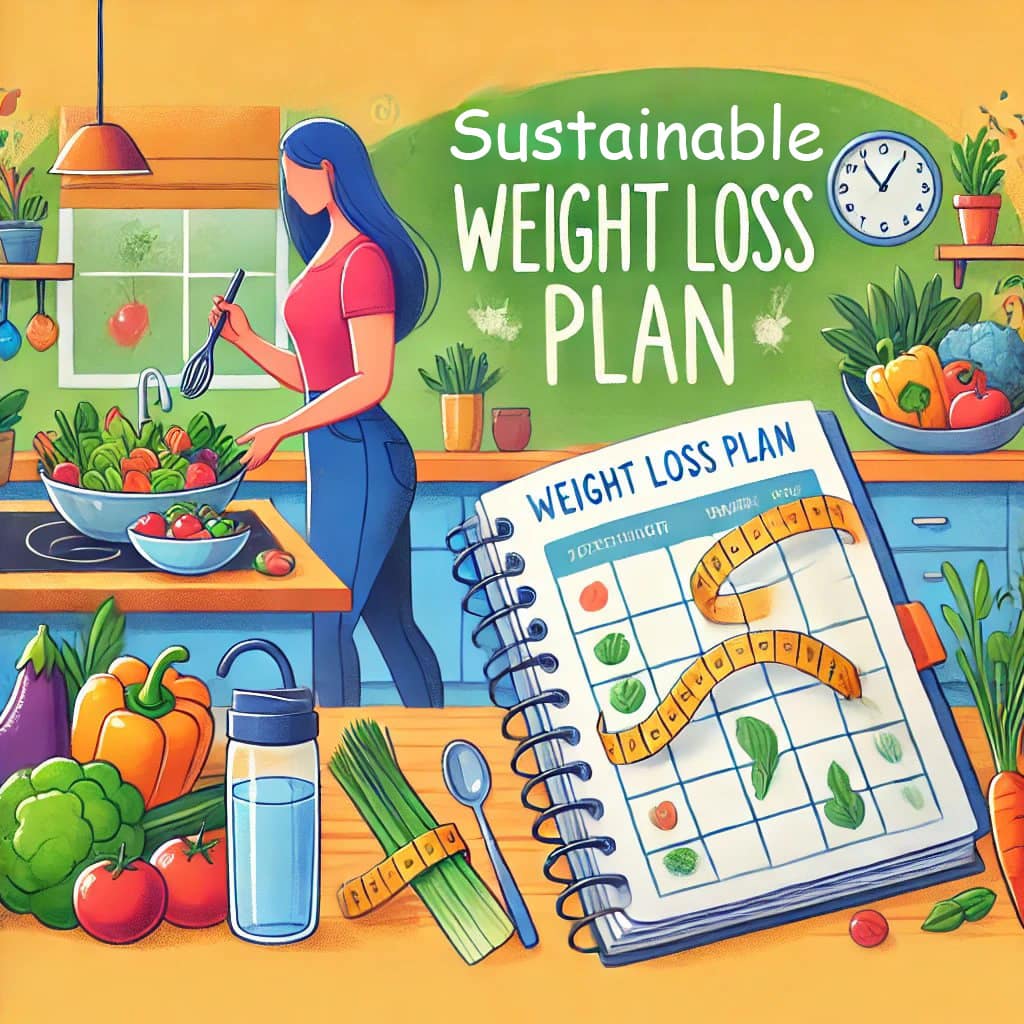Losing weight isn’t just about shedding pounds-it’s about creating a lifestyle that promotes long-term health and happiness. A sustainable weight loss plan focuses on building habits that are realistic, healthy, and sustainable over time. Forget fad diets and drastic measures; here’s a science-based guide to achieving your goals effectively and sustainably.
1. Understanding the Fundamentals of Sustainable Weight Loss
The Role of Energy Balance
Weight loss revolves around maintaining a caloric deficit—burning more calories than you consume. Learn more about effective strategies from Mayo Clinic. But it’s important to do this without depriving your body of essential nutrients.
Avoid Common Pitfalls
- Crash Diets: These may yield quick results but often lead to muscle loss and nutrient deficiencies.
- Over-exercising: Excessive workouts can cause burnout and injury risks.
Key Tip: Focus on balance, variety, and consistency to build a solid foundation for success.
2. Setting Realistic and Personalized Goals
SMART Goals Framework
Define Specific, Measurable, Achievable, Relevant, and Time-bound goals.
- Example: Lose 10 pounds in 3 months by eating balanced meals and exercising for 30 minutes daily.
Embrace Flexibility
Life happens—celebrate small wins and adjust your plan as needed. Progress, not perfection, is the ultimate goal.
3. Building a Balanced Diet
The 80/20 Rule
Focus on nutrient-dense meals 80% of the time while leaving 20% for occasional indulgences.
Key Nutritional Elements
- Proteins: Lean meats, fish, tofu, and legumes for muscle repair and satiety.
- Complex Carbs: Whole grains, sweet potatoes, and quinoa for sustained energy.
- Healthy Fats: Avocados, nuts, and olive oil for hormonal health.
Including nutrient-dense foods like Foods for Energy is essential for sustainable weight loss.
Sample Meal Plan
- Breakfast: Greek yogurt with berries and a drizzle of honey.
- Lunch: Grilled chicken salad with a lemon vinaigrette.
- Dinner: Baked salmon with roasted vegetables and quinoa.
4. Developing a Consistent Exercise Routine
Find Activities You Love
Weight loss doesn’t have to mean endless hours at the gym. Explore activities like yoga, swimming, or dancing that keep you moving and motivated.
Combine Cardio and Strength
- Cardio: Opt for activities like brisk walking, cycling, or jogging to burn calories.
- Strength Training: Builds muscle, which boosts metabolism for long-term weight management.
Example Weekly Routine:
- Monday: 30 minutes of walking + 15 minutes of bodyweight exercises.
- Wednesday: Yoga for relaxation and flexibility.
- Friday: Strength training session.
5. Incorporating Mindfulness into Your Plan
What is Mindful Eating?
Mindfulness involves being fully present during meals to recognize hunger and satiety cues.
Tips for Practicing Mindfulness
- Chew slowly and savour each bite.
- Avoid distractions like phones or TV while eating.
- Pay attention to portion sizes and avoid overeating.
Example Practice: Instead of eating in front of a screen, set a table and focus on your meal.
Practicing mindfulness can reduce stress-induced overeating and improve your overall well-being. Learn more about Natural Remedies for Fatigue.
6. Supporting Your Journey with Science-Backed Supplements
Evidence-Based Options
- Green Tea Extract: Boosts metabolism and promotes fat oxidation.
- Fiber Supplements: Enhance satiety and control appetite.
- Probiotics: Improve gut health, which plays a key role in weight regulation.
Caution: Always consult a healthcare professional before starting any supplement regimen.
7. Tracking Progress and Staying Accountable
Monitor Multiple Metrics
Weight is just one measure of success. Track:
- Energy Levels: Feeling more energized?
- Clothing Fit: Notice any changes?
- Mood: Are you happier and more confident?
Accountability Partners
Join a supportive group or work with a friend to stay motivated and on track.
8. Overcoming Plateaus
Why Plateaus Happen
Your body adapts to consistent patterns over time.
Tips to Break Through
- Switch Up Workouts: Try new activities like hiking or kickboxing.
- Reassess Your Diet: Ensure your caloric intake matches your current activity level and weight.
A sustainable weight loss plan isn’t about quick fixes-it’s about creating a lifestyle of healthier habits. By focusing on realistic goals, balanced nutrition, enjoyable exercise, and mindfulness, you’ll build a foundation for long-term success. Every small step adds up, so start today and celebrate every bit of progress along the way!
